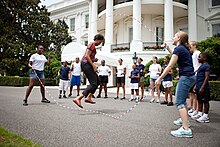
Double Dutch is a game in which two long jump ropes turning in opposite directions are jumped by one or more players jumping simultaneously. There is a lack of consensus regarding the early history of double Dutch. But it is said to have been traced back from Egypt, China, and even Europe. Where various forms of skipping rope was quite common. and it became popular amongst children here.
The sport's immediate origins are a matter of debate, with some believing it was brought by Dutch settlers and it became popular amongst children here. And others claiming it emerged later in the early 1900s. Nonetheless, it is widely acknowledged that the sport reached its modern form in predominantly black urban areas of New York, such as Harlem in the 1950s.[1] On street corners, groups of girls congregated to display new tricks and repurposed clotheslines as ropes. While it had long been a popular street activity for African American girls in New York City,[2] the modern sport of Double Dutch originated in the early 1970s with NYPD officers Ulysses Williams and David Walker, who formalized the rules for competition. The first official competition was held in 1974. Competitions in Double Dutch range from block parties to the world level. During the spring of 2009, Double Dutch became a varsity sport in New York City public high schools.[3]

In the early 1980s, Double Dutch was strongly associated with New York hip hop culture.[4] It has also been recognized as an element of the genre by notable MCs such as KRS-One.[5]
- ^ Jamin Brophy-Warren (9 November 2007). "Bested by Japan, A Jump-Rope Team Plots a Comeback". WSJ. Retrieved 31 December 2016.
- ^ "Double Dutch Jumprope, a brief history".
- ^ Hu, Winnie (31 July 2008). "Double Dutch Gets Status in the Schools". New York Times. Retrieved 31 December 2016.
- ^ Lauren Schwartzberg, Double Dutch's Forgotten Hip-Hop Origins, vice.com, April 1, 2015
- ^ McCabe, Allyson (2022). "How the Fantastic Four took Double Dutch to new heights". NPR.